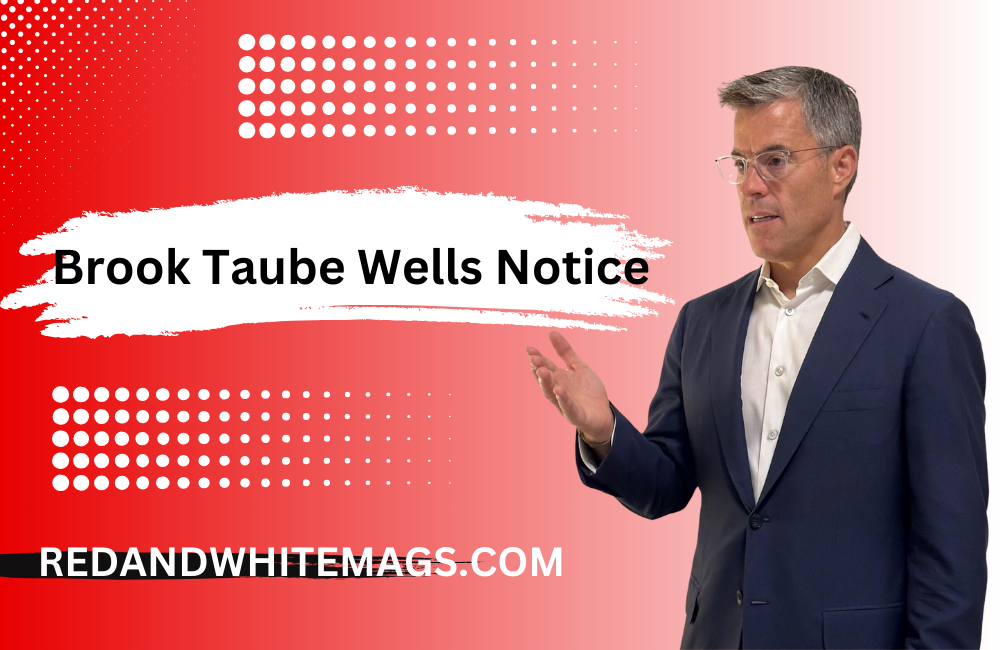Understanding the Brook Taube Wells Notice: Implications and Industry Impact
Introduction
In the intricate realm of finance, few occurrences draw as much attention as the issuance of a Wells Notice. Recently, Brook Taube, a prominent figure in the financial industry, found himself at the center of discussion after receiving a Wells Notice from the Securities and Exchange Commission (SEC). This article aims to delve into the complexities surrounding the Brook Taube Wells Notice, exploring its implications and providing a comprehensive understanding of its broader impact on the financial sector.
Who is Brook Taube?
Brook Taube stands as a distinguished name in the investment community, boasting extensive experience in asset management and financial strategy development. Over decades, Taube has cultivated a reputation as a discerning investor, holding pivotal roles in various financial institutions. His career highlights encompass managing substantial portfolios, making high-stakes investment decisions, and significantly contributing to the financial services industry. Taube’s expertise and leadership have garnered recognition and respect among peers and investors alike.
Understanding the Wells Notice
A Wells Notice serves as a formal communication from the SEC to individuals or firms, indicating the agency’s intention to initiate enforcement action against them. This notice is a crucial part of the SEC’s efforts to uphold fair and orderly markets by ensuring compliance with regulations. Receiving a Wells Notice carries substantial weight, signaling that the SEC has conducted an investigation and found evidence suggesting violations of securities laws. Consequently, this can lead to legal battles, financial penalties, and significant damage to one’s professional reputation.
Overview of the Brook Taube Wells Notice
The issuance of a Wells Notice to Brook Taube has sparked considerable interest within the financial community, triggering speculation about the nature of the allegations and potential repercussions. While specifics often remain confidential until formal charges are filed, such notices typically involve accusations of fraud, misrepresentation, or other regulatory infractions. Beyond scrutinizing Taube’s practices, this notice underscores the stringent regulatory environment in which financial professionals operate.
Legal and Regulatory Framework
The enforcement of securities laws in the United States operates within a robust legal framework governed by statutes, regulations, and enforcement guidelines. The SEC plays a central role in overseeing compliance with securities laws, establishing procedures for the issuance and resolution of Wells Notices. Key statutes include the Securities Act of 1933 and the Securities Exchange Act of 1934, which lay the groundwork for regulating securities transactions and safeguarding investors’ interests. Through its enforcement actions, the SEC aims to deter misconduct, promote transparency, and maintain market integrity.
Read Also: Brook B. Taube: Successful Entrepreneur, Business Leader, Philanthropist
Response Strategies
Upon receiving a Wells Notice, individuals and entities must formulate a meticulous response strategy. Engaging legal representation is paramount, as experienced attorneys can offer guidance throughout the investigative process and help construct a robust defense. Response strategies may involve:
- Thoroughly reviewing the notice to grasp the specific allegations and the SEC’s concerns.
- Collecting relevant documents and evidence to bolster the defense and refute the allegations.
- Crafting a Wells Submission—a formal response outlining reasons why charges should not be filed, highlighting compliance efforts, and presenting counterarguments.
- Engaging in discussions with the SEC to negotiate a settlement or resolution before formal charges are filed.
Effective response strategies can mitigate risks, safeguard one’s reputation, and ensure a fair outcome.
Impact on Reputation and Business Operations
The issuance of a Wells Notice can have far-reaching consequences for both personal reputation and business operations. Negative publicity and media coverage can tarnish an individual’s or company’s reputation, affecting relationships with clients, investors, and business partners. Moreover, regulatory investigations can divert attention and resources from core business activities, leading to operational inefficiencies and financial strain. Legal expenses, potential fines, and penalties further exacerbate the financial implications, while investor and stakeholder confidence may wane, resulting in stock price volatility and changes in investment strategies.
Industry Perspectives and Commentary
High-profile cases like the Brook Taube Wells Notice often elicit commentary from industry experts and stakeholders. Financial analysts, regulatory professionals, and market participants closely monitor such cases to assess their implications. Common themes in industry commentary include the importance of regulatory oversight, robust compliance programs, and proactive risk management practices. Additionally, analyzing market reactions and investor sentiment provides valuable insights into the broader impact of regulatory actions on the financial ecosystem.
Case Studies and Precedents
Examining past cases involving Wells Notices offers valuable insights into potential outcomes and response strategies. By studying precedents, individuals and entities can gain a better understanding of the regulatory landscape and tailor their approach accordingly. Notable case studies underscore the significance of a strategic response and the potential for favorable outcomes with the right approach.
Public Sentiment and Media Coverage
Public sentiment and media coverage play a pivotal role in shaping perceptions of high-profile cases. The Brook Taube Wells Notice has garnered media attention, with various outlets reporting on the allegations and potential implications. Public reactions can influence regulatory and judicial decisions, as well as impact the reputation of the individuals and entities involved. Effective crisis management strategies, including transparent communication and proactive public relations efforts, can help mitigate negative publicity and maintain stakeholder trust.
Legal Consequences and Future Implications
The legal consequences of a Wells Notice can be profound, depending on the nature of the allegations and the outcome of the SEC’s investigation. Potential consequences include fines, penalties, sanctions, and long-term damage to professional reputation. Moreover, the future implications of the Brook Taube Wells Notice extend beyond immediate legal ramifications. The case may set precedents, influencing regulatory practices, industry standards, and the importance of regulatory compliance and proactive risk management in the financial sector.
Read Also: Andrea Skeete: The Strength and Resilience Behind a Boxing Legend
Conclusion
The issuance of a Wells Notice to Brook Taube underscores the complexities and risks inherent in the financial sector. While the outcome remains uncertain, the situation emphasizes the significance of regulatory oversight, compliance, and proactive risk management. Staying informed and prepared is crucial for navigating potential challenges and safeguarding one’s reputation and interests. By understanding the intricacies of securities enforcement and adopting effective response strategies, individuals and entities can mitigate risks and uphold the integrity of the industry.
Read Also: The Life and Legacy of Yuki Ikeda: Bruce Wilpon Wife





